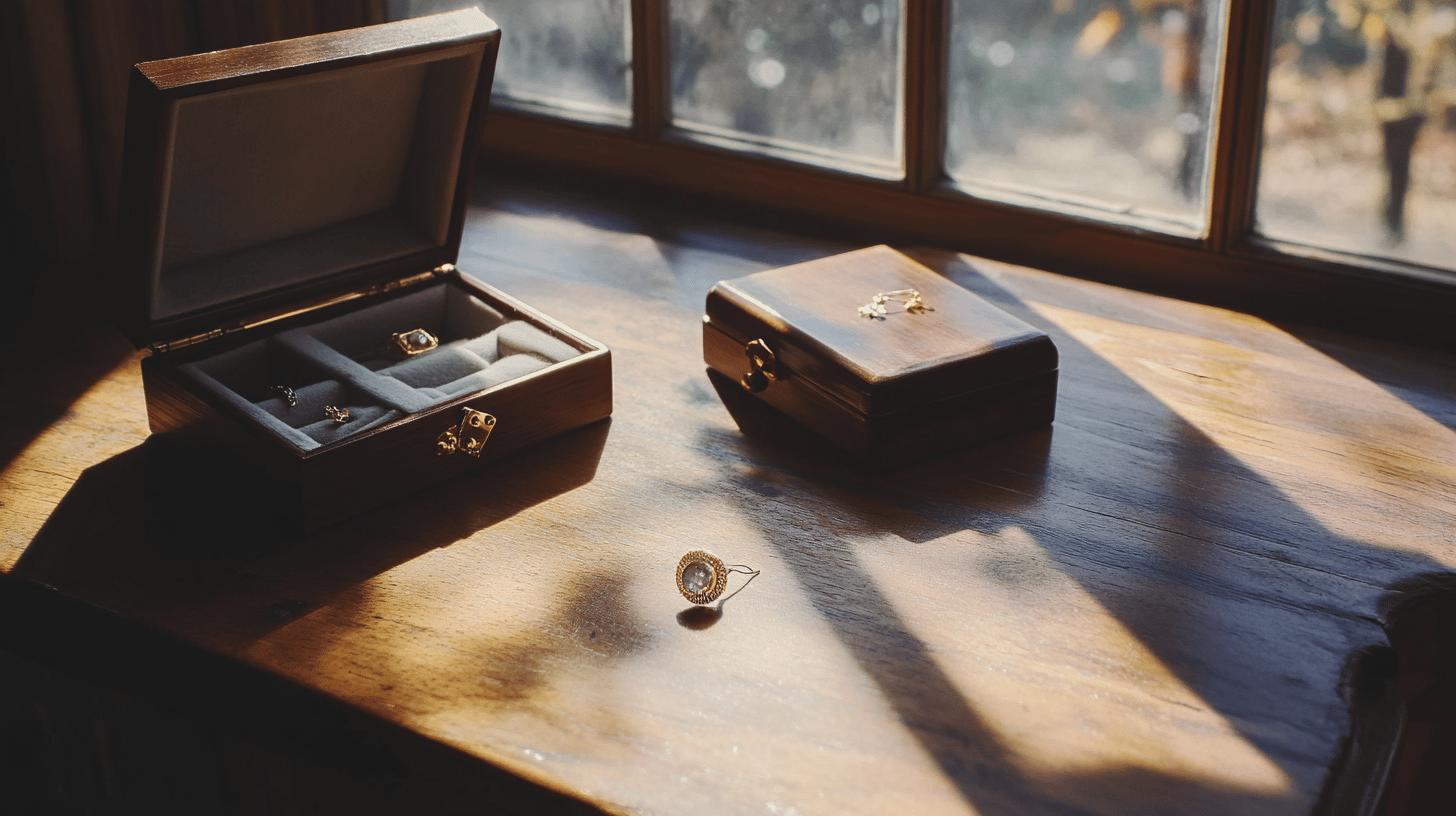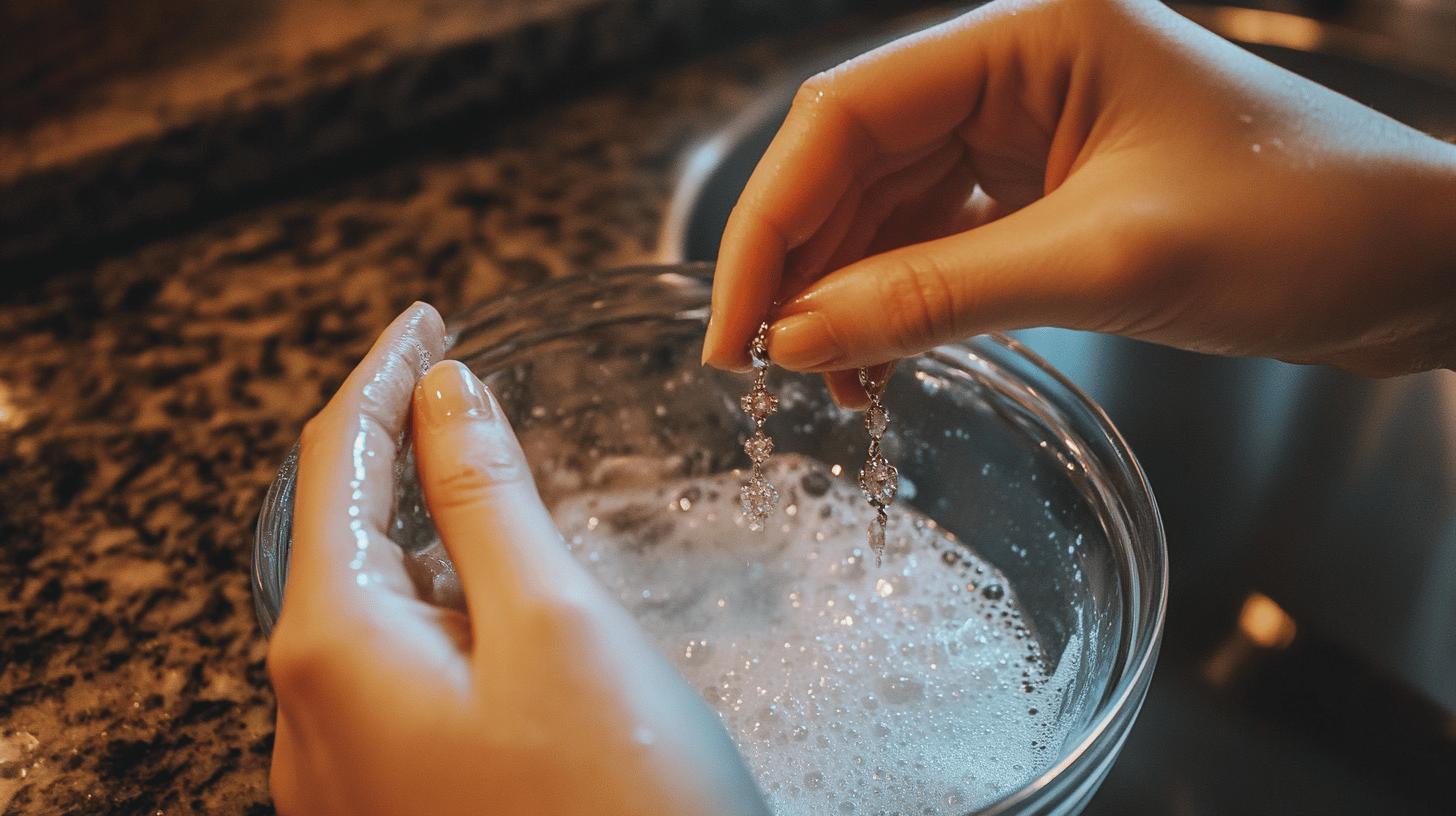
Did you know that alcohol-based disinfectants could be harming your earrings and your skin? When it comes to cleaning your precious accessories, finding alternatives to alcohol is not only safer but also just as effective. This article dives into the best methods for disinfecting your earrings without using alcohol, ensuring you maintain optimal hygiene without risking irritation or damage. Read on to discover practical, non-alcohol solutions that will keep your jewellery sparkling and your skin protected.
Why Disinfect Earrings Without Alcohol?
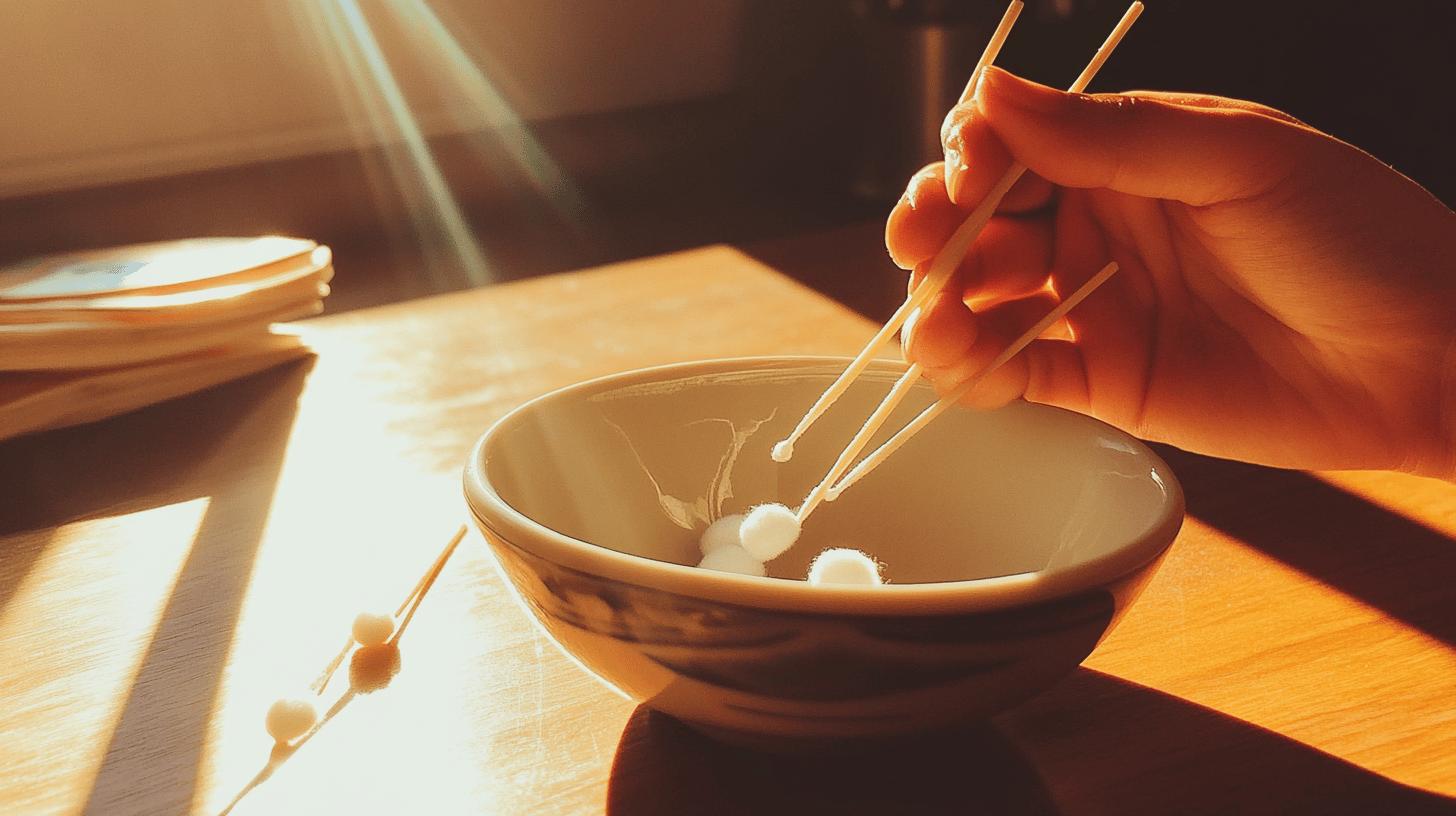
Alcohol-based disinfectants can be harsh on the skin, particularly for those with sensitive skin or new piercings. Alcohol can slow down the healing process by drying out the skin and causing irritation. For individuals prone to allergic reactions or skin sensitivities, using alcohol-free methods can prevent unnecessary discomfort and potential complications.
Non-alcohol disinfecting methods provide a gentler alternative, maintaining hygiene without the harsh side effects. They are equally effective at eliminating bacteria and preventing infections, ensuring that earrings remain safe to wear. These methods are especially beneficial for those with sensitive skin, as they reduce the risk of irritation and promote better overall skin health.
Common Non-Alcohol Disinfecting Methods:
- Hydrogen peroxide
- Baking soda and water paste
- White vinegar and water solution
- Mild antibacterial soap and warm water
- Saltwater solution
Regular cleaning and disinfecting of earrings are crucial for maintaining good hygiene and preventing infections. By opting for non-alcohol methods, you protect both your skin and your jewellery, ensuring they remain in excellent condition. Make it a routine to clean your earrings regularly to enjoy safe and beautiful accessories.
Preparing to Disinfect Earrings Without Alcohol
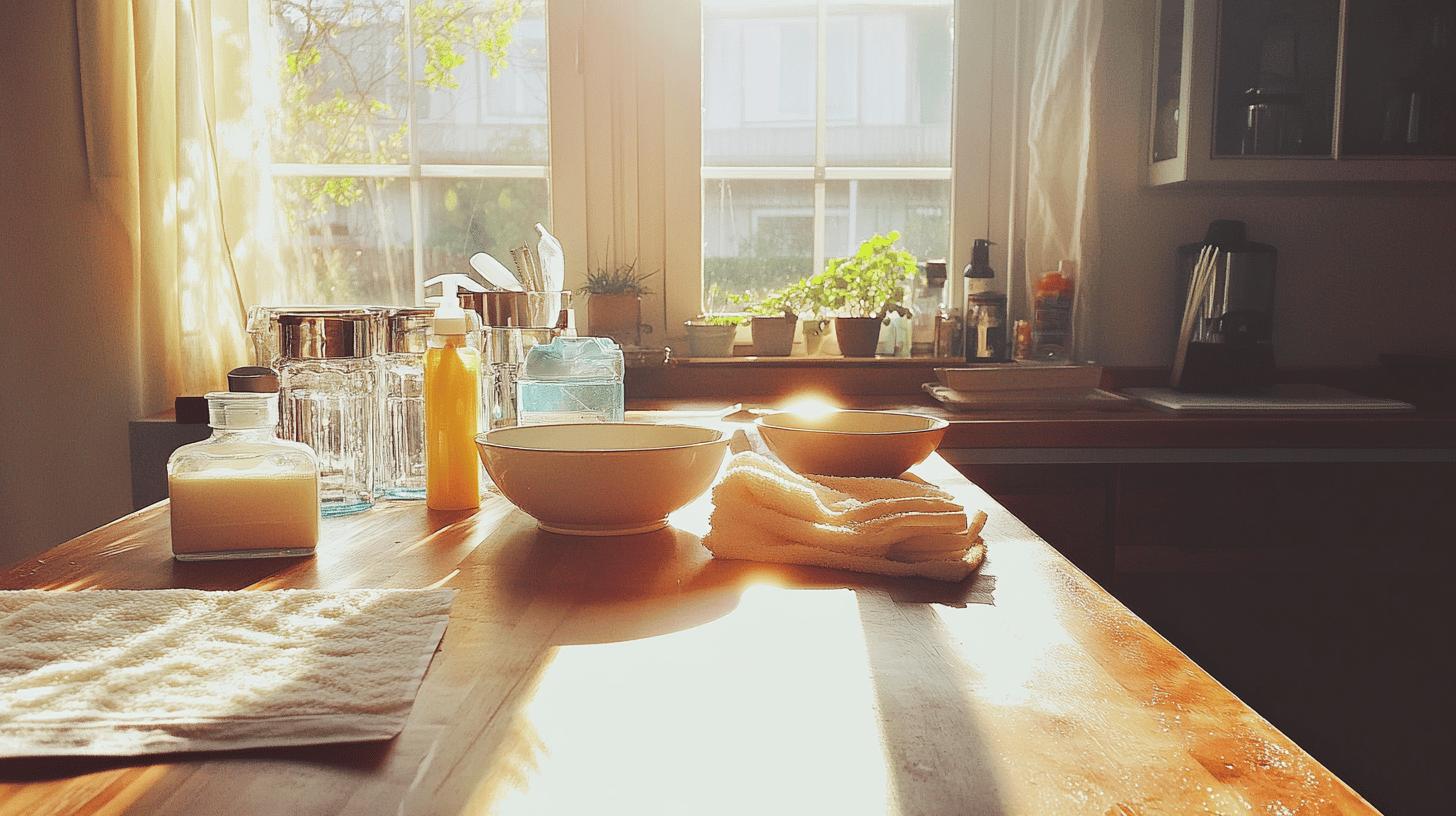
Proper preparation is essential for effectively disinfecting earrings without alcohol. By taking the necessary steps beforehand, you ensure a clean and safe environment, which helps prevent infections and maintains the integrity of your jewellery. Regularly sterilising the earring post is crucial, as it comes into direct contact with your skin and can harbour bacteria if not cleaned properly.
Gathering the right supplies is the next critical step. Common supplies needed for alcohol-free disinfection include mild soap, water, soft cloths, and a small bowl. Using these items ensures that you can clean your earrings gently without causing any damage or irritation to your skin. Having everything ready before you start the cleaning process helps make the task more efficient and effective.
Steps to Prepare for Cleaning
- Wash your hands thoroughly.
- Prepare a clean working area.
- Gather necessary supplies: mild soap, water, soft cloths, a small bowl.
By following these preparation steps, you create an optimal environment for disinfecting your earrings safely. Ensuring cleanliness and organisation not only protects your earrings but also minimises the risk of transferring bacteria or dirt during the cleaning process.
Disinfecting Earrings with Hydrogen Peroxide
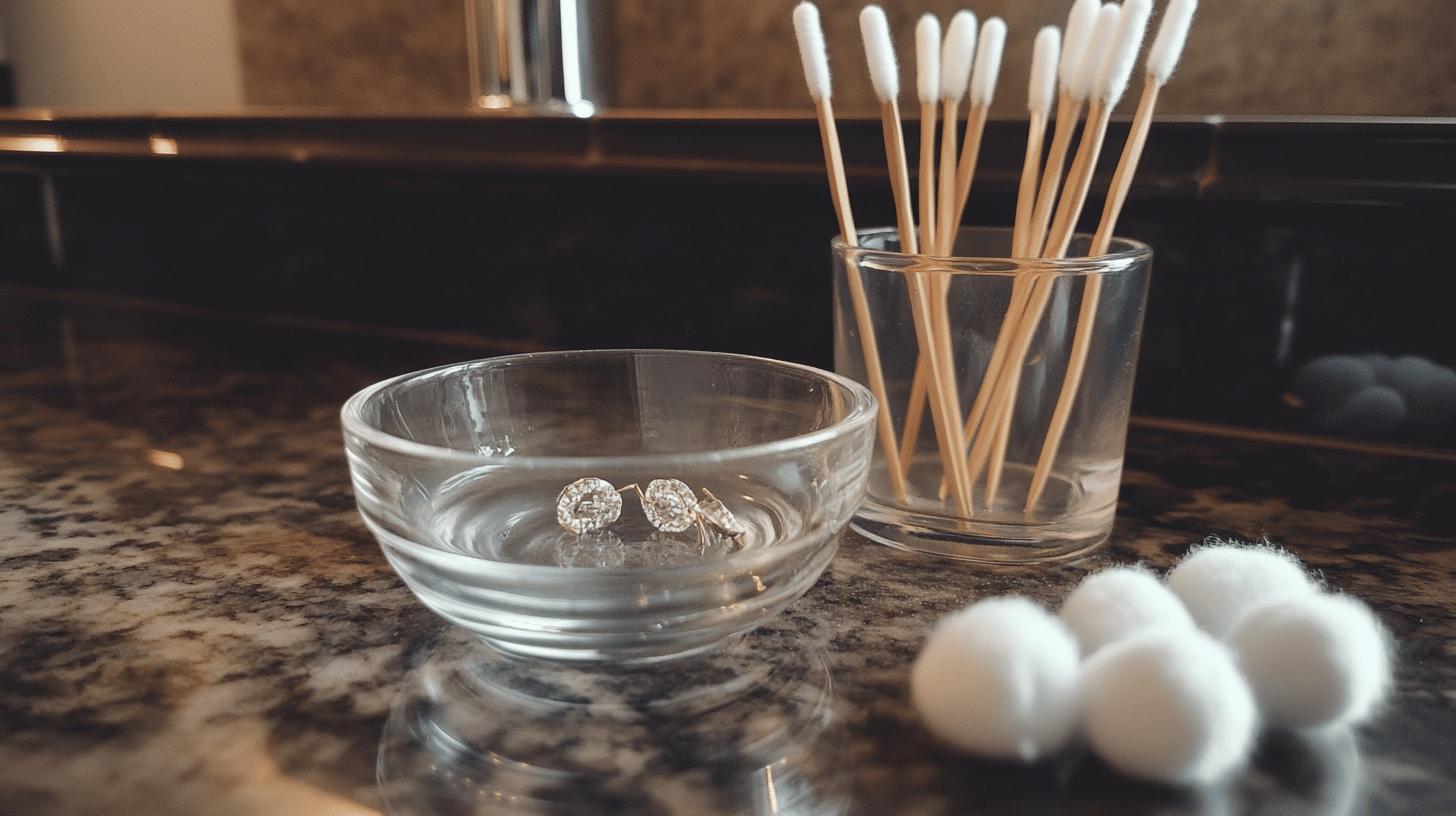
Hydrogen peroxide is a powerful and effective disinfectant for earrings. It has strong antibacterial properties, making it an excellent choice for eliminating germs and preventing infections. Using hydrogen peroxide ensures that your earrings are thoroughly cleaned without the need for harsh chemicals like alcohol. This method is particularly beneficial for those with sensitive skin or allergies, as it provides a gentle yet effective cleaning solution.
Procedure to Disinfect Earrings with Hydrogen Peroxide:
- Pour hydrogen peroxide into a small bowl.
- Place earrings in the bowl and soak for 5-10 minutes.
- Use a cotton swab dipped in hydrogen peroxide to clean the posts and clasps.
- Rinse the earrings thoroughly with water.
- Dry the earrings completely by placing them post-side up.
After soaking and cleaning your earrings with hydrogen peroxide, it is crucial to rinse them thoroughly with water to remove any remaining solution. This step ensures that no residue is left on the earrings, which could cause irritation when worn. Once rinsed, dry the earrings completely by placing them post-side up. Proper drying prevents moisture build-up, which can lead to bacterial growth. This simple yet effective method keeps your earrings hygienic and safe to wear.
Cleaning Earrings with Baking Soda
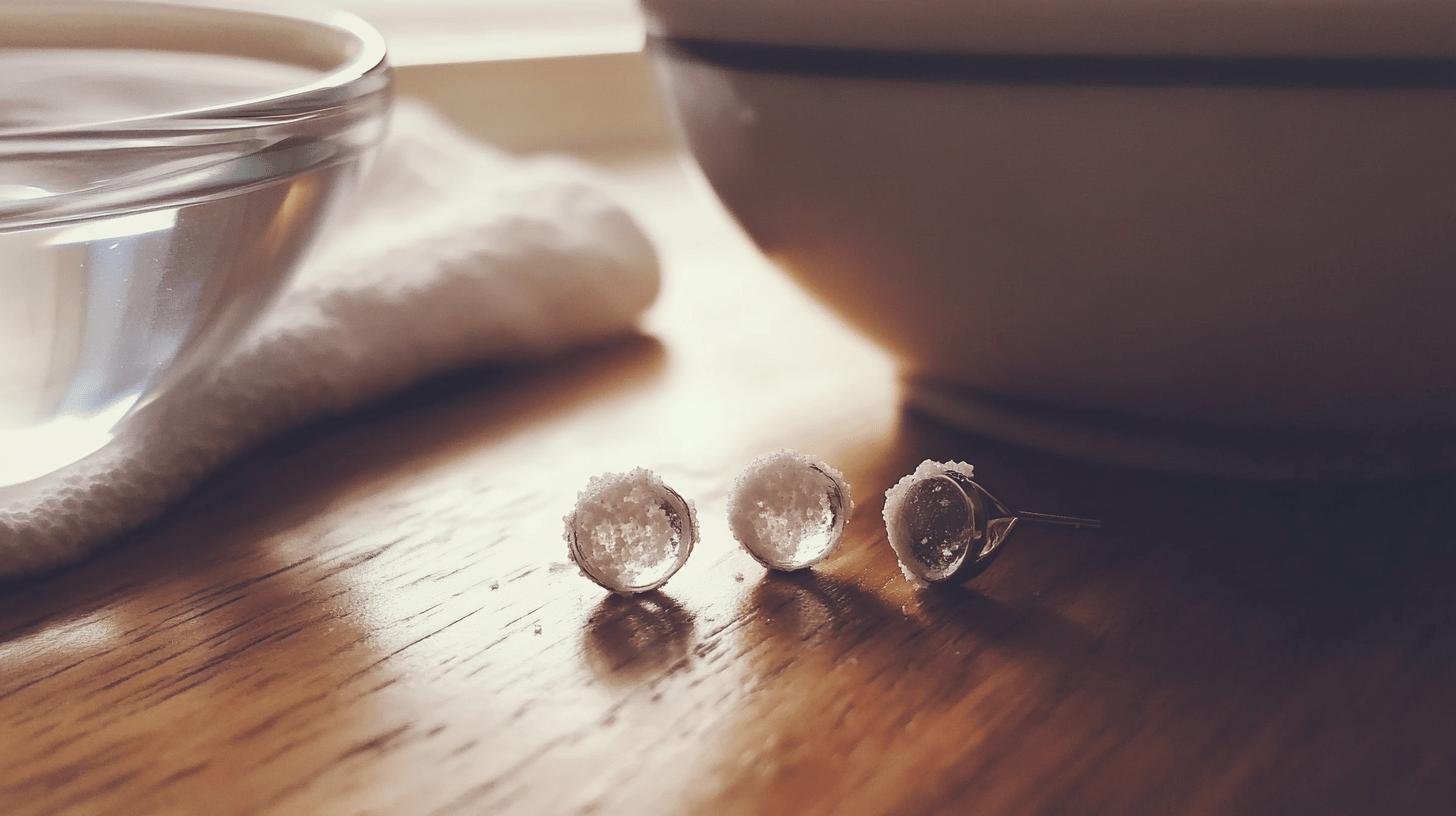
Baking soda is a natural and effective cleaning agent for earrings. Its mild abrasive properties make it ideal for removing dirt and grime without causing damage to delicate jewellery. Moreover, baking soda’s natural deodorising and antibacterial qualities help eliminate germs and unpleasant odours, ensuring your earrings remain hygienic and fresh. Using baking soda is especially beneficial for those with sensitive skin, as it is gentle and free from harsh chemicals.
Process to Clean Earrings with Baking Soda:
- Mix baking soda with water to form a thick paste.
- Apply the paste to the earrings using a soft cloth or cotton swab.
- Allow the paste to sit for a few minutes.
- Rinse the earrings thoroughly with water.
- Dry the earrings completely using a soft cloth.
Thorough rinsing is crucial after cleaning your earrings with baking soda. Any residual paste left on the jewellery can cause irritation when in contact with the skin. After rinsing, ensure the earrings are completely dry by using a soft cloth. Proper drying not only prevents moisture build-up, which can lead to bacterial growth, but it also helps maintain the lustre and longevity of your earrings. By incorporating baking soda into your cleaning routine, you can keep your earrings in pristine condition without resorting to alcohol-based solutions.
Using Vinegar to Disinfect Earrings
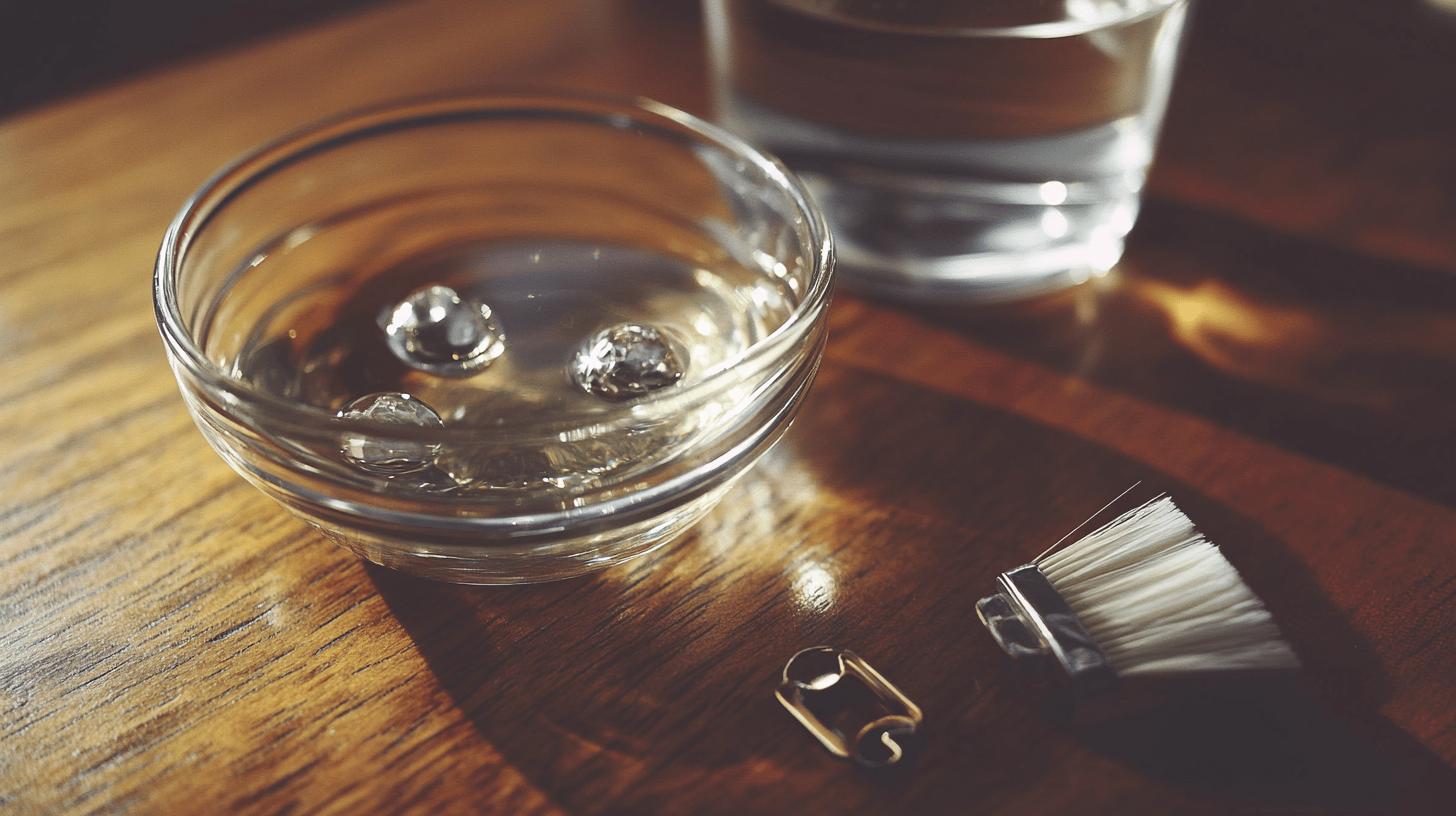
Vinegar is a natural disinfectant that effectively cleans and sanitises earrings without the need for harsh chemicals. Its acidic properties help break down dirt and kill bacteria, making it a safe and gentle alternative to alcohol-based disinfectants. Vinegar is particularly suitable for those with sensitive skin, as it reduces the risk of irritation while ensuring that your earrings remain hygienic and free from harmful pathogens.
How to Disinfect Earrings with Vinegar:
- Mix equal parts white vinegar and water in a small bowl.
- Submerge the earrings in the solution for 10-15 minutes.
- Use a soft brush to gently scrub the earrings if needed.
- Rinse the earrings thoroughly with water.
- Dry the earrings completely using a soft cloth.
Rinsing and drying the earrings thoroughly after using vinegar is crucial to avoid any residual solution that could cause skin irritation. Make sure to rinse with clean water to remove all traces of vinegar, and then dry the earrings completely using a soft cloth. Proper drying prevents moisture build-up, which can lead to bacterial growth. By following these steps, you can maintain the cleanliness and safety of your earrings, ensuring they remain in excellent condition for everyday wear.
Sterilizing Earrings with Boiling Water
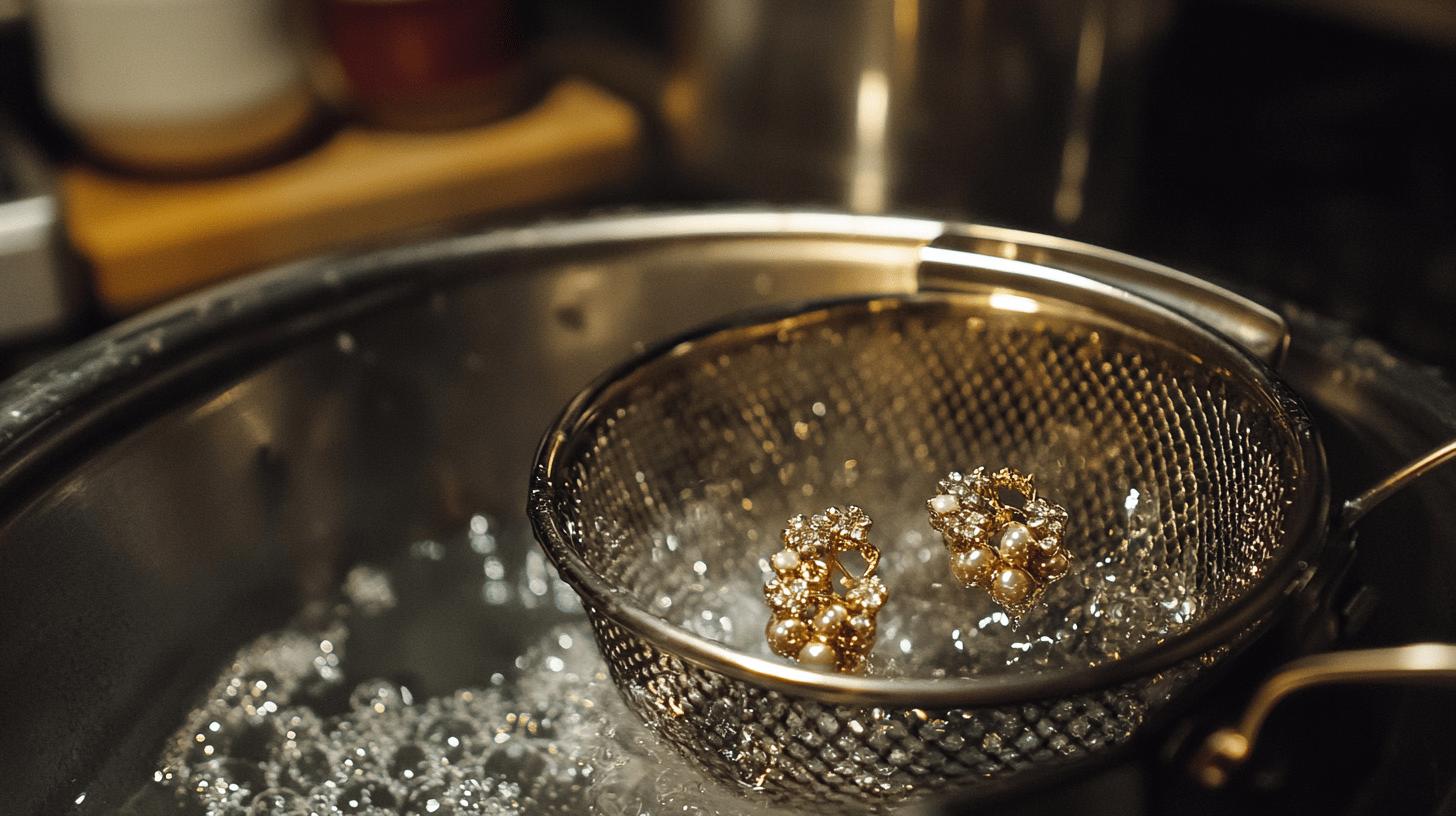
Boiling water is an effective method for sterilizing earrings, provided they are made of materials that can withstand high temperatures. Metals like gold, silver, and stainless steel are suitable for this method, while delicate materials such as pearls and certain gemstones should be avoided to prevent damage. Ensuring your earrings can endure boiling water is crucial to maintaining their integrity and appearance.
To sterilize earrings with boiling water, start by bringing a pot of water to a rolling boil. Place the earrings in a strainer to prevent small pieces from getting lost, then submerge the strainer in the boiling water. Allow the earrings to boil for 5-10 minutes, ensuring they are fully immersed. This process effectively kills bacteria and removes dirt, leaving your earrings clean and germ-free.
After boiling, it is essential to dry the earrings completely to prevent bacterial growth. Use a clean, soft cloth to pat them dry, making sure all moisture is removed. Proper drying not only ensures hygiene but also helps maintain the longevity and lustre of your earrings. By following these steps, you can safely and effectively sterilize your earrings without the use of alcohol.
Natural and Household Products for Cleaning Earrings
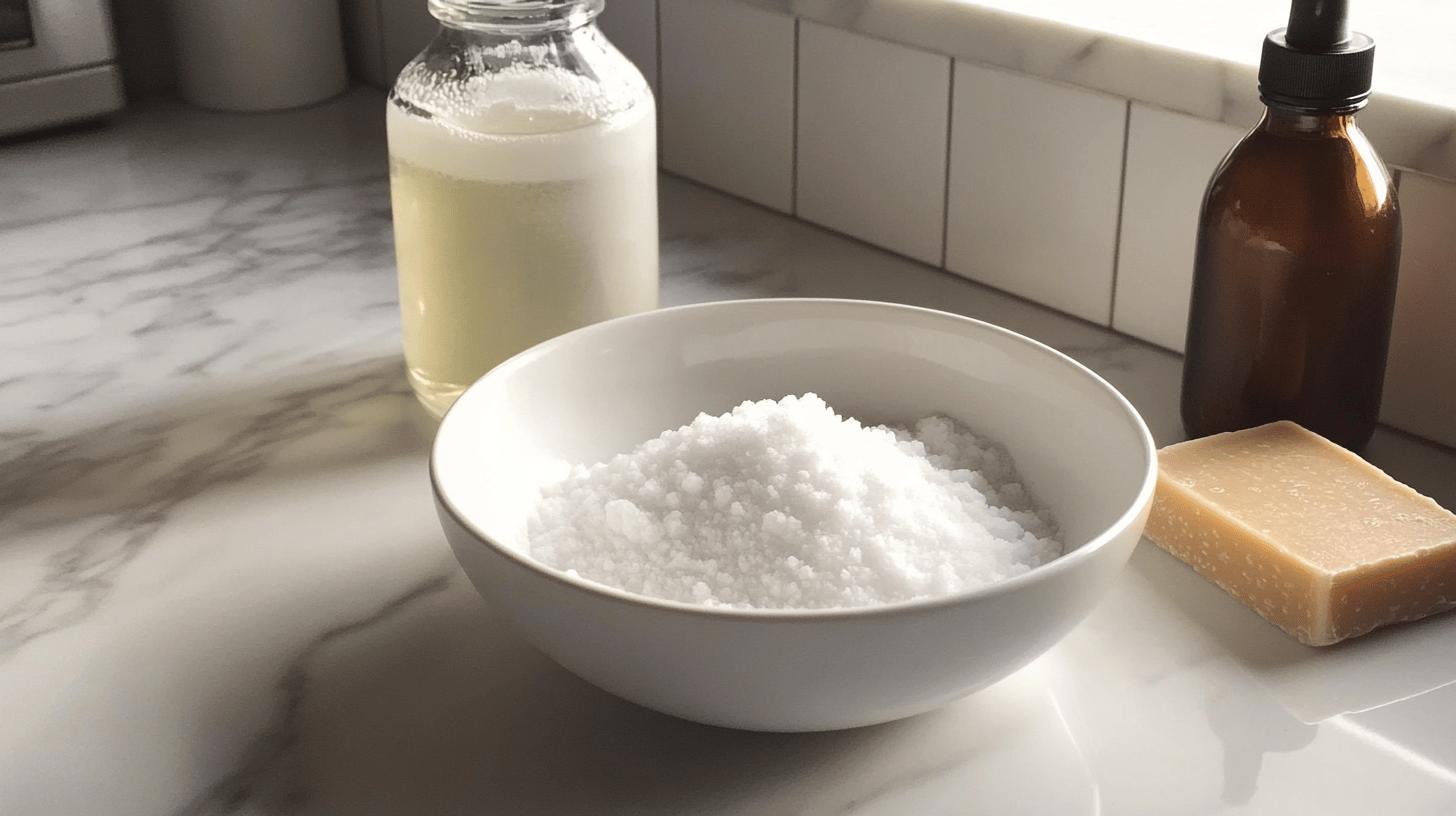
Natural disinfectants for earrings offer a safe and effective way to maintain hygiene without resorting to harsh chemicals. Many household items can serve as excellent cleaning agents, providing a gentle yet thorough cleanse. Products like salt water, baking soda, and vinegar have natural antibacterial properties, making them ideal for sanitising earrings. These methods are particularly beneficial for individuals with sensitive skin, as they minimise the risk of irritation and allergic reactions.
Using natural disinfectants not only ensures the cleanliness of your earrings but also preserves their integrity. Harsh chemicals can sometimes damage delicate materials, whereas natural alternatives are less likely to cause harm. For instance, salt water is a gentle option that effectively cleans without causing any abrasion to the jewellery. Baking soda, on the other hand, offers a mild abrasive quality that helps remove stubborn grime, while vinegar’s acidic nature aids in breaking down dirt and bacteria.
Recommended Natural Products
- Salt water: Dissolve ¼ tsp of salt in water.
- Baking soda: Make a paste with water.
- Vinegar: Mix with water in equal parts.
- Mild antibacterial soap: Use with warm water.
Regularly using these household items for sanitising your earrings ensures that they remain free from harmful bacteria and dirt. Salt water can be used as a daily rinse, providing a simple and effective cleaning routine. Baking soda paste works well for deeper cleans, particularly for earrings that have accumulated grime over time. Vinegar, mixed with water, serves as a robust disinfectant, ideal for periodic thorough cleaning. Lastly, mild antibacterial soap combined with warm water offers a straightforward yet effective method for regular maintenance. By incorporating these natural products into your cleaning routine, you can keep your earrings hygienic and in excellent condition, all while avoiding the use of alcohol.
Safety Tips for Disinfecting Earrings Without Alcohol
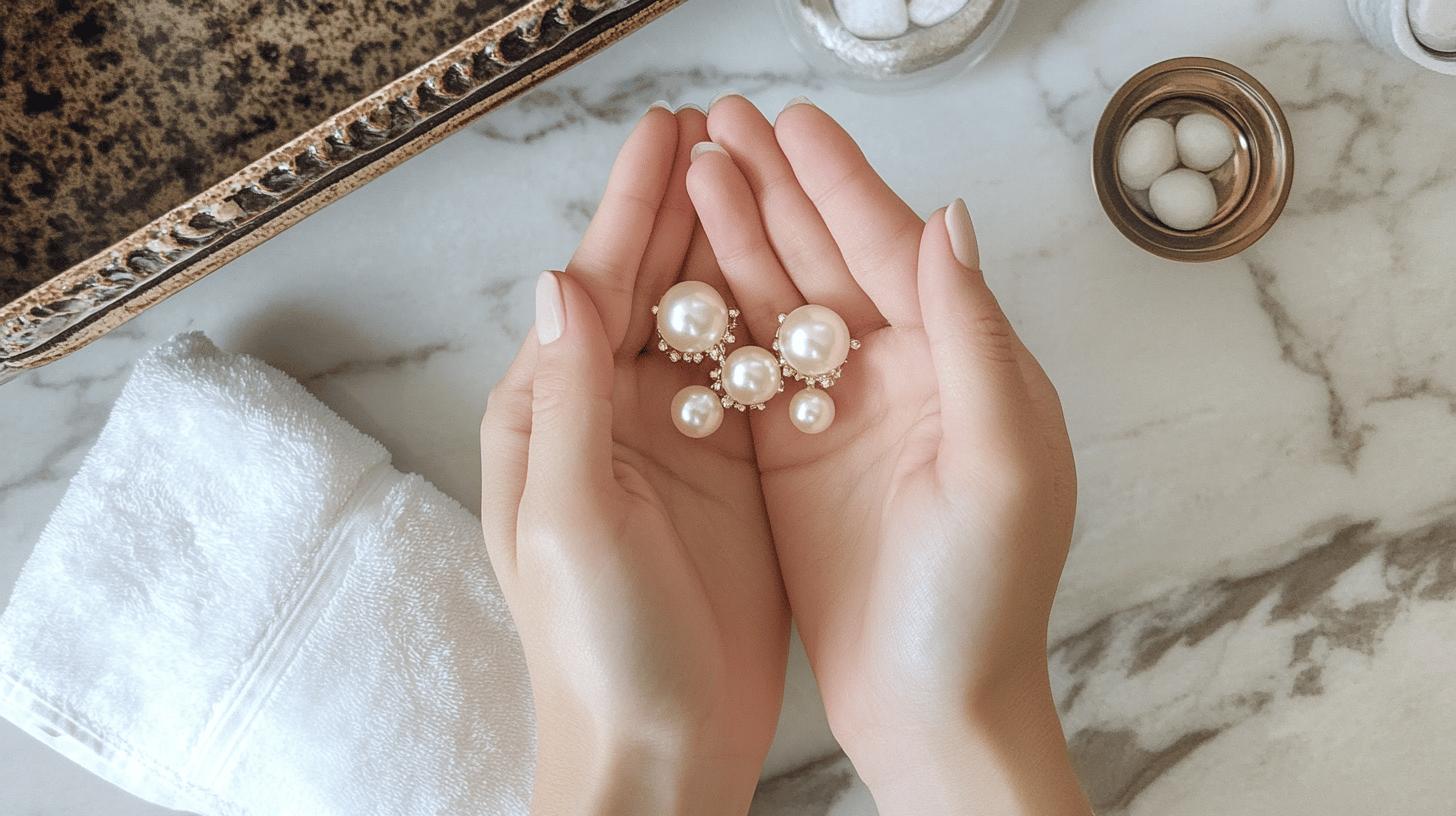
When disinfecting earrings without alcohol, general safety precautions are crucial to prevent damage and maintain hygiene. Delicate materials like pearls and precious stones require special care, as they can be easily damaged by abrasive substances or excessive moisture. Ensuring earrings are completely dry after cleaning is essential to prevent bacterial growth, which can lead to infections. Regularly cleaning and disinfecting earrings helps maintain their appearance and hygiene, reducing the risk of skin irritation and other issues.
Specific Safety Tips:
- Handle delicate materials with care.
- Use appropriate cleaning agents for different materials.
- Always dry earrings completely after cleaning.
- Avoid using harsh chemicals on sensitive skin.
- Regularly check earrings for signs of wear or damage.
Regular cleaning and disinfection are key to maintaining the hygiene and appearance of your earrings. By following these tips, you can ensure that your earrings remain safe to wear and free from harmful bacteria. Regular maintenance not only prevents infections but also prolongs the life of your jewellery, keeping it looking its best.
Final Words
In the action, the blog discussed the need for disinfecting earrings without using alcohol, pointing out the risks associated with alcohol-based disinfectants and the benefits of non-alcohol methods. It then provided essential steps for preparing to disinfect earrings, different methods like hydrogen peroxide, baking soda, vinegar, and boiling water, and recommended natural products.
Regularly cleaning earrings without harsh chemicals is crucial for maintaining hygiene. Safe and natural alternatives can prevent infections while being gentle on the skin.
Use these methods to ensure your earrings are always clean, safe, and ready to enhance your style.
FAQ
How to Disinfect Earrings Without Alcohol Reddit?
To disinfect earrings without alcohol, use hydrogen peroxide, salt water, or a mixture of white vinegar and water. These methods clean effectively without the drying effects of alcohol.
How to Disinfect Earrings Without Alcohol Vinegar?
Mix equal parts white vinegar and water in a bowl. Soak the earrings for 10-15 minutes. Rinse thoroughly with water and dry with a soft cloth.
How to Sterilize Earrings with Salt?
Dissolve ¼ teaspoon of salt in a small bowl of warm water. Soak the earrings for 5-10 minutes, then rinse with clean water and dry thoroughly.
How to Disinfect Earrings at Home?
To disinfect earrings at home, use hydrogen peroxide, vinegar, or salt water. Ensure thorough cleaning by soaking and rinsing the earrings before drying them completely.
How to Sterilize Earrings with Boiling Water?
Boil water and immerse the earrings for 5-10 minutes. Use a strainer to avoid losing small pieces. Remove and dry the earrings completely to prevent bacterial growth.
How to Disinfect Earrings with Alcohol?
Soak the earrings in rubbing alcohol for a few minutes. Use a cotton swab dipped in alcohol to clean the posts and clasps thoroughly. Rinse and dry completely with a soft cloth.
How to Clean Stud Earrings?
Use a mixture of mild soap and warm water. Gently scrub the earrings with a soft brush, rinse with clean water, and dry with a soft cloth.
How to Sterilize Earrings for Piercings?
Sterilize by soaking earrings in hydrogen peroxide or salt water for 5-10 minutes. Ensure thorough rinsing and drying to maintain hygiene and prevent infection.
What is Best to Disinfect Earrings?
Hydrogen peroxide and salt water are highly effective. These methods are gentle on the skin and do not slow the healing process of new piercings.
How Do You Disinfect a Piercing Without Alcohol?
Use hydrogen peroxide, salt water, or a mixture of white vinegar and water. Soak the piercing jewellery for 5-10 minutes, rinse thoroughly, and dry with a soft cloth.
Does Hand Sanitiser Sterilise Earrings?
Hand sanitiser is not recommended for sterilising earrings as it contains additional components that may irritate the skin or damage the earrings. Use hydrogen peroxide or salt water instead.
How to Sterilise Earrings with Salt and Water?
Dissolve ¼ teaspoon of salt in a small bowl of warm water. Soak the earrings for 5-10 minutes, rinse thoroughly with clean water, and dry with a soft cloth.

